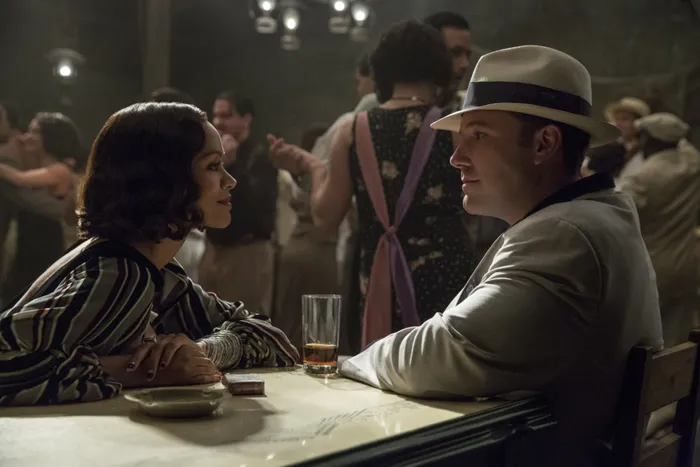
In his outings as writer-director, Ben Affleck has shown an aptitude for tense, gritty material, arguably even more so in the vividly inhabited working-class Boston crime milieu of Gone Baby Gone and The Town than in his Oscar winner, Argo. So part of the disappointment of his engrossing but unexceptional fourth feature, Live by Night, is the departure from Beantown early on, when the action shifts to Prohibition-era Florida. But the more nagging hole in the thriller is Affleck himself, playing a tough guy with a sense of right and wrong, in a stolid performance that takes up a lot of space without packing the necessary gravitas.
Originally optioned by Warner Bros. as a vehicle for Leonardo DiCaprio, who remains on board as a producer, this is Affleck’s second screen adaptation of a Dennis Lehane novel, following Gone Baby Gone.
But unlike that contemporary drama, the 1920s setting here only serves to point up how much more suited this kind of sprawling, granular crime narrative now seems to longform television, post- Boardwalk Empire. The movie is watchable enough but no nail-biter, particularly once two of the most compelling characters, played by Brendan Gleeson and Sienna Miller, are sidelined.
Adult male audiences with an appetite for old-school gangster action might be intrigued, but anyone hoping this would join the ranks of distinctive Prohibition thrillers like The Untouchables, Miller’s Crossing or Once Upon a Time in America will find it lacks the teeth of those films, even though it doesn’t stint on bloodshed. However, given the emboldened resurgence of white supremacist movements and the rise in hate crimes in the wake of Donald Trump’s election, the movie might draw attention with an unexpectedly timely plot thread in which Affleck’s character, Joe Coughlin, stands up to KKK intimidation.
Disillusioned by his experiences as a soldier in World War I, Coughlin returns to Boston an outlaw, vowing never to bow to authority again. After 10 years running a robbery operation, he’s approached by Irish gangster Albert White (Robert Glenister) to help out in the Mob war against the Italians, headed by Maso Pescatore (Remo Girone). Joe declines, but gets pulled into organised crime via his clandestine relationship with White’s mistress, Emma Gould (Miller).
Knowing trouble when he sees it, Joe’s father, Police Deputy Superintendent Thomas Coughlin (Gleeson), tries to steer his son away from the sassy Irish tart. But a botched bank-heist getaway and a double-cross land Joe in prison, believing that Emma has been iced.
Miller, outfitted in fabulous flapper chic by costumer Jacqueline West, makes a lively impression as a woman accustomed to using her sexual power to mask feelings of class inferiority, and the movie leaves you wanting a lot more of her. Likewise Gleeson, who hits commanding notes as an honest lawman repelled by his son’s chosen life and yet bound by a father’s love. “What you put out into the world will always come back to you, but never how you predict,” he tells Joe, in words destined to haunt him.
In the movie’s most rushed section, Joe uses knowledge of Irving Figgis’s daughter Loretta (Elle Fanning), who went to Hollywood to pursue movie stardom, as leverage to get to R.D.
She returns to town as an evangelical preacher who escaped damnation, dressing like a bride of Christ and whipping up a fuss in hellfire tent sermons against the demon rum and the ruin of gambling. That makes local authorities nervous about Joe’s plan to set up Pescatore in the nascent casino business.
While Chris Cooper (Figgis) has some strong moments as a fiercely conflicted man, in some ways mirroring Thomas Coughlin, Fanning is given too little screen time to make her character’s transformation feel more than perfunctory, robbing a key scene of impact during which Loretta opens up to Joe.
Graciela Suarez (Zoe Saldana) also loses some depth compared to the novel, with her revolutionary political zeal reduced to founding a sanctuary for abandoned Cuban women and children. Saldana plays her with a sad-eyed sultriness and a slinky wardrobe to match, but the role is purely decorative. Chris Messina’s cheeky swagger makes Dion a more diverting character.
The slack plotting builds with more inevitability than momentum toward a clash in which Joe and Dion are caught between White and Pescatore, the latter now flanked by his dimwit son Digger (Max Casella).
But while Affleck aims for the Coppola tradition of operatic bloodbaths, the execution falls short, unfolding with the same rote efficiency as an earlier Boston cops-and-robbers chase or Joe’s series of retaliatory strikes against the KKK.
Flavourless characterisations from Glenister and Girone as the rival Mob kingpins don’t help.
Affleck is not at his best here, looking uncomfortable in the boxy period suits, and coming off as somewhat lifeless for a man who sees himself as an outlaw, playing by his own rules and accountable only to his own codes of honor and compassion.On the plus side, the movie looks sleek, with evocative period production design by Jess Gonchor and elegant framing from cinematographer Robert Richardson, painting in a subdued monochromatic palette that heats up once the action travels south.
Live by Night is solid enough entertainment, but it lacks the nasty edge. – Hollywood Reporter
